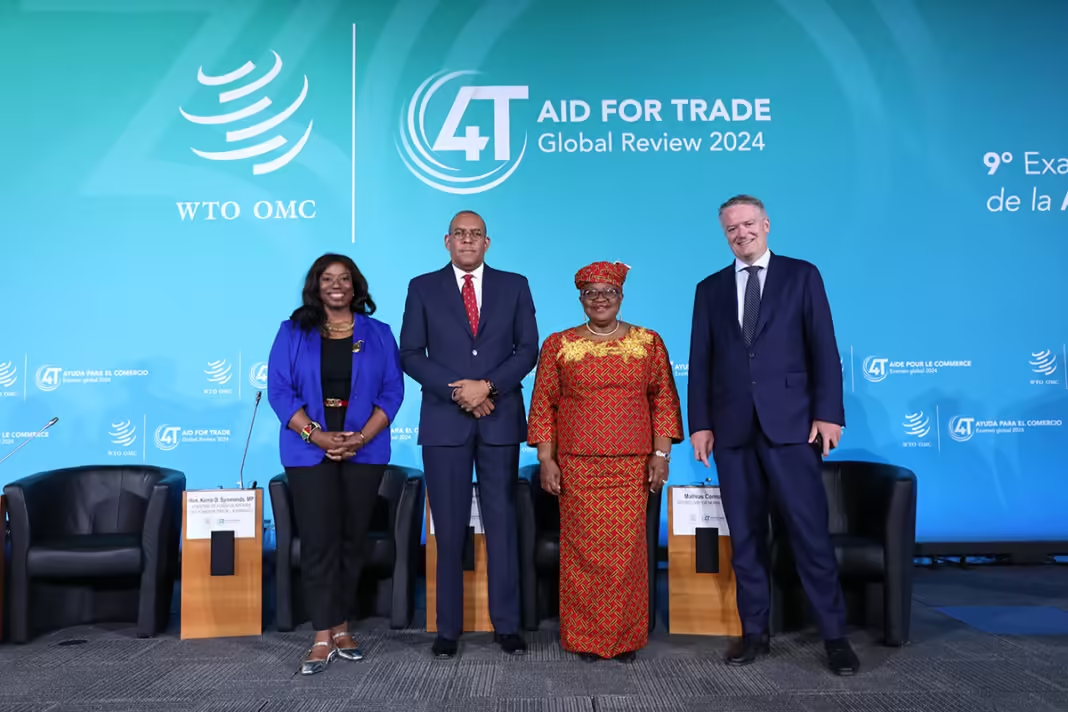WTO Director-General Ngozi Okonjo-Iweala has said that Trade offers up opportunities that developing economies can and should seize.
Okonjo-Iweala at the opening of the 9th Global Review of Aid for Trade on 26 June.
Director-General Ngozi Okonjo-Iweala recalled that the WTO is marking its 30th anniversary this year, coinciding with the 80th anniversary of the Bretton Woods Conference, which established the General Agreement on Tariffs and Trade (GATT). Reflecting on the transformative changes over the decades, DG Okonjo-Iweala highlighted the significant achievements in global trade and economic development.
“One of the most remarkable changes since 1995 is that trade-enabled growth has lifted over 1.5 billion people out of extreme poverty,” she said. This period also saw low- and middle-income economies nearly double their share in global exports from 16.5% to 32.2%, while the percentage of their populations living on less than US$ 2.15 per day has dropped from 40% to under 11%.
Despite these advances, the current global trade landscape faces several challenges. “We are now in troubled times. We see increasing protectionism, the return of industrial policy, and the shaping of a narrative about trade that casts it as anti-people and anti-planet. We see signs of fragmentation in the trade data, with like-minded countries beginning to trade more with each other than with others that are not so like-minded,” she said.
“Just as poor countries left behind during the recent wave of globalization look to benefit from the open, predictable multilateral trading system, they are being told that globalization is over, and presumably that they should find another way to fend for themselves,” she added. “Aid for Trade remains a vital instrument to help them do just that.”
DG Okonjo-Iweala also underscored the importance of creating an enabling environment for developing economies to leverage trade for growth, job creation and sustainable development. Key strategies include maintaining open global markets, enhancing Aid for Trade initiatives, crafting policies to support green trade, and reducing business risks through agreements like the Investment Facilitation for Development Agreement. Her full remarks are here.
OECD Secretary-General Mathias Cormann highlighted the role of Aid for Trade investments in supporting open markets and a rules-based international trading system. He emphasized the importance of infrastructure development, private finance, and trade facilitation in leveraging trade for development and growth. More needs to be done to ensure everyone can benefit from the upside of global trade, he added. He also noted OECD’s efforts to promote high standards and corporate governance in official development assistance.
“Aid for Trade continues to be an effective channel for building synergies between the trade and economic development objectives of donor and developing countries. Our latest report shows, in 2022, disbursements and commitments hit a record high of USD US$ 51.1 billion, up 14% from 2021,” OECD Secretary-General Cormann said.
The WTO and OECD flagship publication – “Aid for Trade at a Glance” – launched at the opening session, delves into developing economies’ trade and development priorities and tracks the volume – and impact – of Aid-for-Trade funding received from trading partners.
Kerrie D. Symmonds, Minister of Foreign Affairs of Barbados, emphasized the Aid for Trade initiative’s enduring relevance in integrating developing economies and least developed countries into the global trading system, reducing trade-related adjustment costs, and enhancing the supply-side capacity of small economies.
The minister reflected on the significant progress made over the years. However, he stressed that persistent challenges, particularly capacity issues, remain unresolved. He highlighted, in particular, the critical need for tangible, effective measures, especially when it comes to climate change.
Minister Symmonds proposed several key actions. First, he called for establishing “guardrails” or robust frameworks to ensure effective implementation of Aid for Trade. He emphasized the need for innovative financing mechanisms, such as the 2022 Bridgetown Initiative, which calls for blended financing and sustainability investments.
Moreover, Minister Symmonds underlined the importance of ensuring the entry into force of the Agreement on Fisheries Subsidies and completing the second wave of negotiations for additional provisions relating to curbing overcapacity and overfishing. He drew attention to a communiqué on fisheries subsidies circulated by over 30 WTO members.
Finally, European Union Commissioner for International Partnerships Jutta Urpilainen delivered a video statement highlighting the pressing need for decisive international action to promote sustainable development amid concurrent global crises.
“One of the most powerful tools at our disposal is trade,” Commissioner Urpilainen stated, emphasizing the role of multilateral cooperation in building a more prosperous and inclusive global trading system. She stressed that the EU and its member states remain the largest provider of Aid for Trade, contributing over 40% of global aid in recent years.
EU Aid for Trade initiatives focus on building capacity to meet technical standards, developing necessary infrastructure, and promoting the inclusion of women and vulnerable groups in international trade, she said. Additionally, the EU is using Aid for Trade to address global crises such as food security. In response to the war in Ukraine, it has collaborated with partner countries to strengthen global agricultural value chains and boost production, she added.


